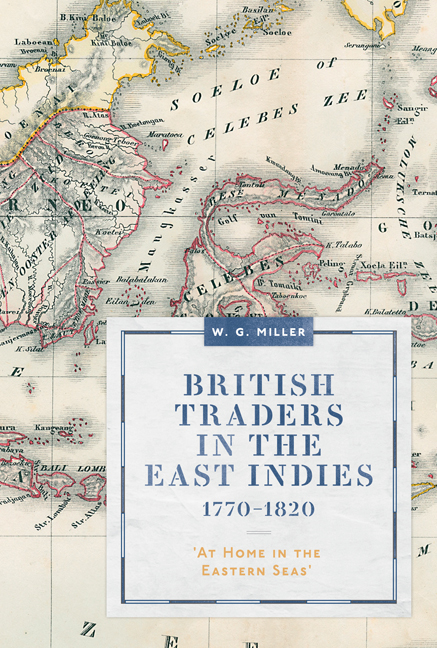Book contents
- Frontmatter
- Dedication
- Contents
- List of illustrations
- Preface
- Acknowledgements
- A note on orthography and unit conversion
- Abbreviations
- Map
- Introduction: the Indian origins of the British country trade
- Chapter One Merchant friends: country traders and the Malays I
- Chapter Two Political allies: country traders and the Malays II
- Chapter Three Inadvertent imperialists: country traders and British officials
- Chapter Four Smugglers and enemies: country traders and the Dutch
- Chapter Five The decline of the country trade in the Malay Archipelago
- Conclusion
- A note on sources
- Bibliography
- Index
- WORLDS OF THE EAST INDIA COMPANY
Introduction: the Indian origins of the British country trade
Published online by Cambridge University Press: 16 September 2020
- Frontmatter
- Dedication
- Contents
- List of illustrations
- Preface
- Acknowledgements
- A note on orthography and unit conversion
- Abbreviations
- Map
- Introduction: the Indian origins of the British country trade
- Chapter One Merchant friends: country traders and the Malays I
- Chapter Two Political allies: country traders and the Malays II
- Chapter Three Inadvertent imperialists: country traders and British officials
- Chapter Four Smugglers and enemies: country traders and the Dutch
- Chapter Five The decline of the country trade in the Malay Archipelago
- Conclusion
- A note on sources
- Bibliography
- Index
- WORLDS OF THE EAST INDIA COMPANY
Summary
To distinguish it from the trade which took place between India and Britain, the British in India referred to trade along the coast of India and between Asian ports as the “country” trade.
From the 1770s, with the increase in European and Parsee-owned ships captained by English commanders, the term “British country trade” came to define a whole new category of this activity. It was nothing less than a “commercial revolution” in the Indian Ocean. Not only was this characterized by a change in the nature of the trade, but was also a result of the huge increase in tonnage. The largest focus of this trade was Southeast Asia. But while this study is chiefly about the country traders in the Malay Archipelago, it is necessary to explain the Sub-continental origins of the group.
Europeans, in particular Portuguese laymen, had been trading privately in Asia since the sixteenth century when Europeans first arrived in numbers. Portugal had trading bases in India, East Asia and Southeast Asia. As Boxer has noted, whatever their official role, “… many of the ‘fidalgos’ and clerics who affected to despise all commercial pursuits, were themselves traders on a considerable scale, either from necessity or from choice”.
British private trade in India originated in the seventeenth century in parallel with the official trade of the largely monopolistic English East India Company (EIC). Much of this private trade was undertaken by Company servants and was initially centred on Surat, on India's west coast. The major part of this early trade by EIC servants was carried out covertly using Asian shipping or on Company vessels. However, in 1665 the English Company cut its losses and said its own shipping would not be involved in port-to-port trade in the Indies. By 1675/76 the right of Company servants to engage in private trade was asserted.
It benefitted the Company to thus permit private trading by its servants, for in doing so the Company could minimize the amounts it paid its staff. Private trading was permitted to allow the servants of the company the capacity to obtain a “competency” in their situation.
- Type
- Chapter
- Information
- British Traders in the East Indies, 1770–1820'At Home in the Eastern Seas', pp. 1 - 18Publisher: Boydell & BrewerPrint publication year: 2020



